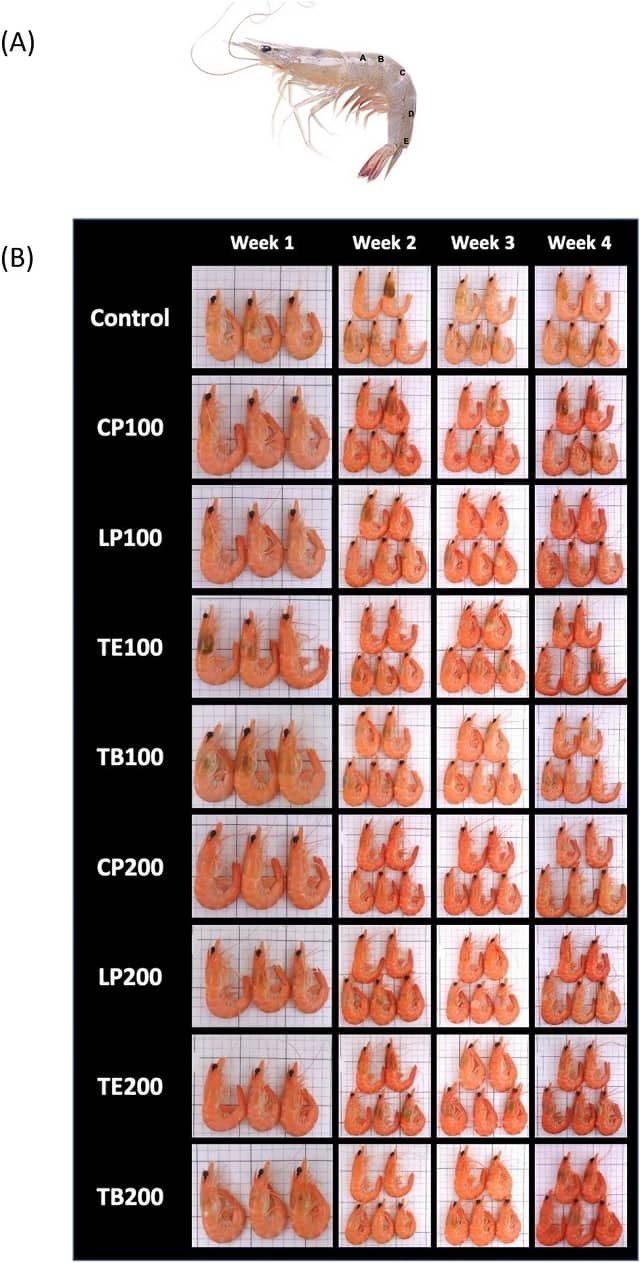Soybean meal is widely used in shrimp aquaculture as a replacement for fish meal. However, high levels of soybean meal can compromise shrimp health as a result of nutrient imbalance.
Researchers from Kasetsart University, DSM Nutritional Products, and the U.S. Soybean Export Council studied the effects of a combination of digestive enzymes (a combination of 6-phytase, a serine protease, and endo-1,3(4)-β-glucanase) and a functional immunostimulatory combination (a mixture of brewer’s yeast, nucleotides, vitamin C and vitamin E) to improve the general health of Pacific white shrimp (Penaeus vannamei) fed a soy-based diet.
Limiting factors for the use of soybean meal
The main limiting factor preventing the effective use of soybean meal in aquafeeds is attributed to antinutritional factors present in soybean meal, which potentially interfere with nutrient absorption and can damage the intestinal epithelium.
These antinutrients include protease inhibitors, lectins, phytates, oligosaccharides, tannins, antigenic proteins, and saponins.
The heat produced during the process of commercial food production usually destroys protease inhibitors and lectins; but other antinutritional factors such as antigenic proteins, tannins, saponins, and oligosaccharides, among others, remain stable.
How to maximize the use of soybean meal?
To maximize the use of soybean meal in feed without seriously affecting animal health, several strategies have been proposed to reduce the level of antinutrients in soybean meal.
Various investigations have proposed the use of microbial fermentation to help break down anti-nutritional compounds, the use of selected soybeans or genetically modified plants, or using formulas with minimal amounts of anti-nutritional factors.
Also, an alternative is to incorporate certain additives in soybean meal-based feeds to reduce any possible undesirable effects caused by soybean anti-nutritional factors. Digestive enzymes and functional immunostimulants are two examples of the latter option.
Digestive enzymes
Various digestive enzymes have been used in animal feed to increase the nutrients present in plants, to improve digestion, and eliminate anti-nutritional factors.
Stay Always Informed
Join our communities to instantly receive the most important news, reports, and analysis from the aquaculture industry.
Phytases, xylanases, and β-glucanases dominate the market for commercial enzyme products, but proteases and other carbohydrases such as mannanases, amylases, pectinases, and α-galactosidases are not uncommon.
At present, there is a trend to use multiple types of digestive enzyme formulations as feed additives; however, these studies are rare in shrimp.
Benefits of digestive enzymes in shrimp
“The present work demonstrated the benefits of the combination of digestive enzymes and a combination of functional immunostimulants as feed additives in mitigating the related adverse effects of soybean meal on shrimp postlarvae and juveniles,” the researchers note.
According to the researchers, with the help of feed additives, the level of soybean meal could be increased to 30% without compromising the health of the shrimp.
Likewise, they highlight that although digestive enzymes are not considered traditional immunostimulants, the immune capacity increased and the resistance of the shrimp to V. parahaemolyticus infection was improved, as demonstrated in experiment 2.
“The exact mechanisms of immune stimulation by digestive enzymes have yet to be elucidated, but it is reasonable to assume that increased nutrient availability as a result of exogenous enzyme activity not only increases growth but also supports immune functions.” normal”, they emphasize.
“Although the study design prevented us from determining the main active ingredients in the feed additive combinations that were responsible for the observed results, the functional immunostimulant or feed enzyme mixtures in the study were shown to perform well in improving animal health,” they affirmed.
Conclusion
“The present study demonstrates that dietary supplementation of shrimp with a combination of digestive enzymes and a combination of functional immunostimulants helps alleviate growth retardation, low survival rate, immunosuppression, and low tolerance to infection to V. parahaemolyticus related to the increasing inclusion of soybean meal in the shrimp diet”, they conclude.
As described in the study, thanks to the combination of enzymes and functional immunostimulants, the maximum amount of soybean meal in feed can be increased up to 30%, while the level of fishmeal can be decreased from 25% to 12.5%. in the diet, without causing detrimental effects on the general health conditions of vannamei shrimp.
The study was funded by the U.S. Soybean Export Council, Thai Royal Feedmill, and DSM Nutritional Products.
Reference (open access)
Chuchird, N., Rairat, T., Keetanon, A., Seguin, D., Chotikachinda, R., Manomaitis, L., & Kanjanamayoon, C. (2023). Effect of feed enzymes and functional immunostimulants supplementation on growth performance and overall health of postlarvae and juvenile Pacific white shrimp, Penaeus vannamei, fed soybean-based diets. Journal of the World Aquaculture Society, 1– 14. https://doi.org/10.1111/jwas.12939
Editor at the digital magazine AquaHoy. He holds a degree in Aquaculture Biology from the National University of Santa (UNS) and a Master’s degree in Science and Innovation Management from the Polytechnic University of Valencia, with postgraduate diplomas in Business Innovation and Innovation Management. He possesses extensive experience in the aquaculture and fisheries sector, having led the Fisheries Innovation Unit of the National Program for Innovation in Fisheries and Aquaculture (PNIPA). He has served as a senior consultant in technology watch, an innovation project formulator and advisor, and a lecturer at UNS. He is a member of the Peruvian College of Biologists and was recognized by the World Aquaculture Society (WAS) in 2016 for his contribution to aquaculture.







